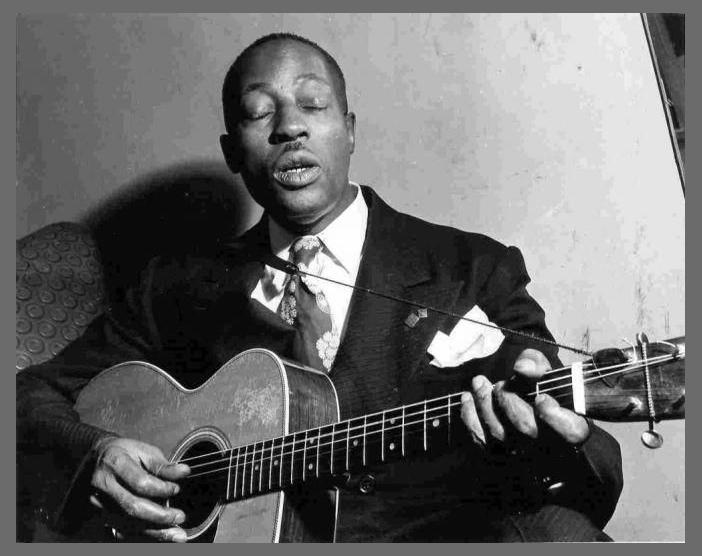 Big Bill Broonzy
Big Bill Broonzy
Big Bill Broonzy: The Bluesman who Defied Racial Barriers
In the annals of American music, Big Bill Broonzy stands as an enigmatic figure whose songs reverberated with the triumphs and tribulations faced by African Americans during the early 20th century.
Early Life and Influences:
Born William Lee Conley Broonzy in Mississippi in 1893, Big Bill was raised amidst the cotton fields and the vibrant blues culture of the Deep South. He began playing guitar as a young man, influenced by legendary bluesmen such as Charley Patton and Son House.
Challenges and Controversies:
Broonzy's career was marked by both personal and societal challenges. As a black musician during the Jim Crow era, he faced discrimination and segregation. Despite these obstacles, he persevered, using his music as a platform to address racial inequality. His song "Black, Brown and White" became a powerful anthem for the Civil Rights Movement, expressing his belief in racial harmony.
Musical Style and Legacy:
Big Bill Broonzy's unique blues sound blended elements of country, folk, and jazz. His songs often explored themes of love, loss, and the struggles of everyday life. He became known for his soulful vocals, intricate guitar playing, and ability to connect with audiences of all backgrounds.
Discography Highlights:
Broonzy's prolific career spanned decades and produced a vast body of work. Some of his most notable albums include:
* Big Bill Broonzy (1952)
* Big Bill Broonzy Blues (1957)
* Big Bill Broonzy Sings Folk Songs (1958)
* Trouble in Mind (1962)
Members:
Big Bill Broonzy performed primarily as a solo artist, but occasionally collaborated with other musicians. Some notable band members included:
* Memphis Slim (piano)
* Sonny Terry (harmonica)
* Brownie McGhee (guitar)
Later Life and Legacy:
In the latter stages of his career, Broonzy's music gained international recognition. He toured extensively, including performances at prestigious venues such as Carnegie Hall. He died in 1958, leaving behind a lasting legacy as one of the most influential blues musicians of all time.
Conclusion:
Big Bill Broonzy's unwavering determination and powerful voice transformed the blues into a force for social change. His songs continue to resonate with listeners today, reminding us of the resilience and spirit of the human experience.
In the annals of American music, Big Bill Broonzy stands as an enigmatic figure whose songs reverberated with the triumphs and tribulations faced by African Americans during the early 20th century.
Early Life and Influences:
Born William Lee Conley Broonzy in Mississippi in 1893, Big Bill was raised amidst the cotton fields and the vibrant blues culture of the Deep South. He began playing guitar as a young man, influenced by legendary bluesmen such as Charley Patton and Son House.
Challenges and Controversies:
Broonzy's career was marked by both personal and societal challenges. As a black musician during the Jim Crow era, he faced discrimination and segregation. Despite these obstacles, he persevered, using his music as a platform to address racial inequality. His song "Black, Brown and White" became a powerful anthem for the Civil Rights Movement, expressing his belief in racial harmony.
Musical Style and Legacy:
Big Bill Broonzy's unique blues sound blended elements of country, folk, and jazz. His songs often explored themes of love, loss, and the struggles of everyday life. He became known for his soulful vocals, intricate guitar playing, and ability to connect with audiences of all backgrounds.
Discography Highlights:
Broonzy's prolific career spanned decades and produced a vast body of work. Some of his most notable albums include:
* Big Bill Broonzy (1952)
* Big Bill Broonzy Blues (1957)
* Big Bill Broonzy Sings Folk Songs (1958)
* Trouble in Mind (1962)
Members:
Big Bill Broonzy performed primarily as a solo artist, but occasionally collaborated with other musicians. Some notable band members included:
* Memphis Slim (piano)
* Sonny Terry (harmonica)
* Brownie McGhee (guitar)
Later Life and Legacy:
In the latter stages of his career, Broonzy's music gained international recognition. He toured extensively, including performances at prestigious venues such as Carnegie Hall. He died in 1958, leaving behind a lasting legacy as one of the most influential blues musicians of all time.
Conclusion:
Big Bill Broonzy's unwavering determination and powerful voice transformed the blues into a force for social change. His songs continue to resonate with listeners today, reminding us of the resilience and spirit of the human experience.